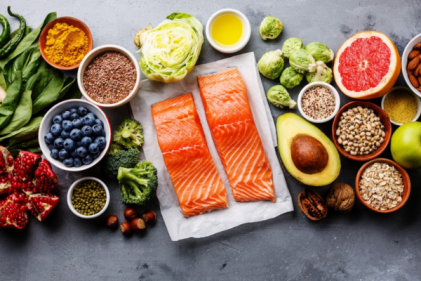
We all know that our digestive systems are home to an infinite number of friendly microbes. We are encouraged to top up our friendly bacteria with probiotic drinks, supplements and fermented foods. But what if the influence of our gut health was more wide-reaching than previously thought? Could the state of our digestive flora reach much farther than healthy digestion and, in fact, be the pivotal foundation for our wellbeing?
Researchers are uncovering more and more exciting interactions between our gut flora and other body functions, from mental health to genetic expression. Supporting healthy gut flora could be vital in a wide range of conditions beyond digestive health. Here are just a few of the latest discoveries relating to the wonderful cultures living inside our intestines right now, and how you can help optimise your internal flora.
Mental health
Researchers at Oxford University recently discovered an interesting connection between anxiety and gut bacteria. When participants were given flora-supporting ‘pre-biotics’, there was a noticeable decline in anxiety symptoms. In fact, this supports previous studies that indicated links between depression, anxiety and even autism and gut health.
At the California Institute of Technology, Professor of Microbiology Dr. Sarkis Mazmanian is heading a research project investigating the connection between gut bacteria and autism. He has found that gut flora are actually able to communicate directly with the brain through molecules that enter the bloodstream, and that these molecules can influence behaviour.
A recent research project in Aarhus University Hospital, in the Netherlands, discovered that patients who had their vagus nerve severed (a common treatment for stomach ulcers – the vagus nerve connects the brain to the digestive system) were protected from developing Parkinson’s disease. The impact of this is wide-ranging – might we see digestive support as part of future treatment plans for depression, anxiety, or even neurological conditions such as Parkinson’s and Alzheimer’s?
Obesity
Obesity is a modern epidemic. But is it all down to poor diet and lack of exercise? Researchers have discovered that obese people tend to have higher levels of a certain type of gut bacteria that are considerably more effective at extracting energy from food, leading to excessive weight gain. These bacteria, known as firmicutes, are encouraged to flourish by the high-sugar, processed-food Western diet, and can overrule the influence of other healthier gut flora.
Poor gut flora can also lead to what is known as a ‘leaky gut’ – where the tiny holes that allow the digested food molecules to pass through into the blood stream are eroded. This erosion allows larger particles that have not been fully digested to pass through, triggering an immune reaction that leads to hormonal imbalance and inflammation. Alternative health practitioners will often focus on repairing digestive integrity when treating obesity, metabolic and endocrine disorders.

Using gut bacteria as medicine
New technologies are being developed that use our gut bacteria in the fight against disease. Facing the dark prospect of antibiotic-resistance, scientists are looking to new avenues in the treatment of common infections. US-based Seres Therapeutics are in trials to launch a treatment using gut biome to treat the antibiotic-resistant hospital infection C.Diff., with the aim of restoring normal bowel flora in infected people. Trials to date have proved extremely effective.
Scientists and doctors alike are becoming acutely aware of the crucial importance of healthy gut flora in a clinical setting, and are now tapping into our body’s own wisdom in the treatment of disease.
In order to ensure that your own friendly gut flora are flourishing, here are some key tips:
-
Avoid excessive use of antibiotics, and replenish the good bacteria with a probiotic after any necessary course of antibiotics.
-
Avoid junk food, sugar and processed foods. These have been shown to diminish the quality of gut flora considerably.
-
Other things that can deplete your friendly bacteria include antibacterial handwash, chlorinated water, food chemicals and pesticides.
-
Ensure you make fermented and probiotic foods part of your daily diet, such as live yogurt, kefir, and fermented vegetables such as sauerkraut.
-
Probiotics love prebiotics, which are a type of fibre that feed the friendly bacteria, and include onion, leeks, garlic and bananas.
Make a healthy gut your priority and your body will thank you - now and in the future.
Fiona O’Farrell is a licensed acupuncturist and naturopath and runs The Gate Clinic in Greystones, Co. Wicklow. For more information call 01 201 7210 or visit www.thegateclinic.ie.







